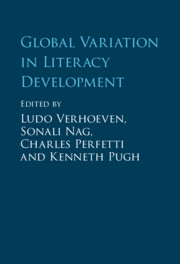Book contents
- Global Variation in Literacy Development
- Global Variation in Literacy Development
- Copyright page
- Contents
- Figures
- Tables
- Contributors
- Abbreviations
- 1 Introduction
- Part I Regional Variations
- Part II Neurobiological and Ecological Markers
- 11 Writing Systems and Global Literacy Development
- 12 Brain Foundations for Learning to Read
- 13 Genetics and Literacy Development
- 14 Role of Self-Regulation in the Transition to School
- 15 Socioeconomic Status, Sociocultural Factors, and Literacy Development
- 16 Sensitivity to Contextual Factors in Literacy Interventions in the Global South
- 17 How Teachers Contribute to Children’s Literacy Success
- 18 The Literacy Ecology of the Home
- 19 Parental Literacy Support in Monolingual and Bilingual Contexts
- 20 Global Literacy
- Index
- References
14 - Role of Self-Regulation in the Transition to School
from Part II - Neurobiological and Ecological Markers
Published online by Cambridge University Press: 23 November 2023
- Global Variation in Literacy Development
- Global Variation in Literacy Development
- Copyright page
- Contents
- Figures
- Tables
- Contributors
- Abbreviations
- 1 Introduction
- Part I Regional Variations
- Part II Neurobiological and Ecological Markers
- 11 Writing Systems and Global Literacy Development
- 12 Brain Foundations for Learning to Read
- 13 Genetics and Literacy Development
- 14 Role of Self-Regulation in the Transition to School
- 15 Socioeconomic Status, Sociocultural Factors, and Literacy Development
- 16 Sensitivity to Contextual Factors in Literacy Interventions in the Global South
- 17 How Teachers Contribute to Children’s Literacy Success
- 18 The Literacy Ecology of the Home
- 19 Parental Literacy Support in Monolingual and Bilingual Contexts
- 20 Global Literacy
- Index
- References
Summary
This chapter goes into the role of children’s self-regulation in their transition from home to school. Over the last two decades, a sizable body of research has documented the importance of the early childhood years as a critical foundation not only for a successful transition to school, but for literacy success in elementary school and beyond. There is evidence that a complex set of factors in the child, family, school, and larger sociocultural context, independently and in interaction, shape the growth of early literacy skills over that crucial time period. Recently, attention has focused on a set of skills called self-regulation (also known as executive function or effortful control), which has been shown to uniquely impact children’s literacy development and academic growth across the school years, as well as success in adult life. This chapter focuses on how self-regulation can be conceptualized. In addition, it examines the extent and nature of individual differences in self-regulation during the transition to school and what unique impact it has on early literacy and later academic achievement. Finally, it is explored to what extent self-regulation can be modified through appropriate environmental stimulation in the home and school environment.
Information
- Type
- Chapter
- Information
- Global Variation in Literacy Development , pp. 316 - 332Publisher: Cambridge University PressPrint publication year: 2023
